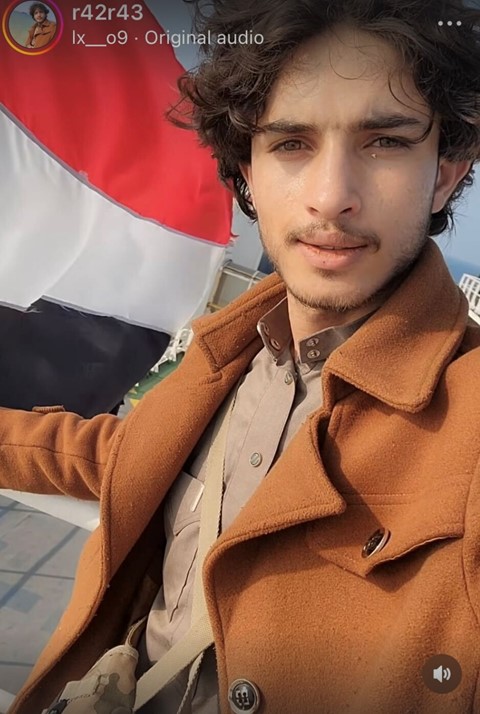19-year-old Rashid Al Haddad has become a social media darling. But who is he?
Rashid Al Haddad – a 19-year-old Yemeni man who went viral this week after posting a video of himself aboard a hijacked container ship – wants people to stop obsessing over his good looks and start focusing on Palestine.
After Haddad’s video launched a thousand ‘is this a safe space…’ posts and earned him the nickname ‘Timhouthi Chalamet’, on Wednesday (January 17) he urged his new fans to cool it: “I did not talk about beauty or anything else, but our issue is Palestine, and this is not the time to talk about beauty,” he wrote on Twitter. “I hope that my message will reach you, a free Palestine, and we will ignite it against the Israeli aggression that violates human rights.”
Since thirsting over a teenager in an active warzone is arguably a little gauche, let’s use this as an opportunity to explore the more substantive issues. Here’s everything you need to know about the man of the hour, the Houthi movement, and how the West is responding to its ongoing blockade.
WHAT DO WE KNOW ABOUT RASHID AL-HADDID?
Earlier this week (January 16), Haddid sat down for an interview with Twitch streamer Hasan Piker, an opportunity that he mostly used to talk about Palestine – he repeatedly said that his only motivation is to stop the ongoing attack on Gaza, which has so far killed over 23,000 Palestinians (a daily death higher toll than any other major 21st-century conflict, according to Oxfam).
On the few occasions where he strayed off-message, he also told Piker that he is a fan of anime series One Piece, is currently single, and doesn’t know who Timothee Chalemet is (nor did he seem to care). Asked how people in Yemen are coping with the aerial bombardment from US and UK military forces, he replied that it feels pretty normal for them, after enduring ten years of brutal civil war. He is grateful for the support he has received from foreigners and said, “Anyone who supports Palestine, we’re with.”
WHO ARE THE HOUTHIS?
Officially known as Ansar Allah, the Houthis are a political and military organisation that control most of Yemen, including its capital city Sana’a, but are not recognised as the official government by the international community. The group formed in the 1990s when they fought against Ali Abdullah Saleh, a dictator who was later overthrown during the 2012 Arab Spring.
When the Houthis seized control of the capital in 2014, this began a civil war with Yemen’s officially recognised government, who were backed by the US and Saudi Arabia. Since then, an estimated 337,000 Yemenis have been killed, either directly – mostly through air strikes carried out by the Saudi-led coalition – or due to large-scale famine and what the UN recently described as the world’s worst humanitarian crisis. Last year, the fighting began to wind down and it looked as though a permanent ceasefire was on the horizon, but over a third of Yemen’s population remains in dire need of humanitarian assistance.
The Houthis, who are backed by Iran, has been characterised as an Islamist movement, with good reason: their official slogan is “Death to America, death to Israel, curses to the Jews, and victory to Islam”. While an official spokesperson has argued that they “don’t really want death to anyone” and that the slogan is “simply against the interference of those governments,” this is undeniably antisemitic rhetoric, and it’s also true that the Houthis have faced accusations of persecuting Yemen’s Jewish population.
At the same time, their ideology combines elements of national liberation and populism, which distinguishes it from groups like Al-Qaeda or Isis (both of whom the Houthis have fought.) According to a Foreign Affairs article from 2015, “Their appeals for anti-corruption, equality, and security are some of the main reasons they have garnered extensive public support and have emerged as a legitimate force of change for the country.”
Have you seen a people being bombed, only to come out the next day in a million-strong protest, chanting:
— مصطفى الخطيب (@khatib__mustafa) January 13, 2024
'We don't care, we don't care,
Make it a world war'
Only in #Yemen !pic.twitter.com/PFoXi6ilBg
WHAT ARE THE HOUTHIS DOING NOW, AND WHY?
Since last November, the Houthis have been attacking commercial ships and seizing cargo in the Red Sea, vowing that they will continue with this strategy until food, medicine, fuel and water are delivered to Gaza – a demand shared by many international organisations. As it stands, hundreds of thousands of Palestinians are experiencing famine, according to the United Nations’s emergency aid chief, and there is a catastrophic shortage of basic items.
The Houthis are in a strong position to disrupt global trade, because they control the Bab-al Mandeb Strait – a narrow strip, separating the Indian Ocean from the Red Sea, which around 15 per cent of the world’s marine traffic has to pass through. The effects of their blockade on the shipping industry have already been significant, with hundreds of container ships being rerouted around Southern Africa (a detour that can add 15 days’ worth of shipping time and could lead to increased prices).
In response to these attacks, a coalition of Western countries have embarked upon “Operation Prosperity Guardian”, a military campaign aimed at bringing the Houthis to heel, and the US has relisted them as a terrorist organisation. Since then, the UK and the US have launched a series of air strikes across 16 sites in Yemen, including the capital city. Undeterred, the Houthis have fired missiles at a US-owned ship and a Royal Navy warship, and are showing no signs of backing down. The day after the first bombs fell, thousands of Yemenis took the streets and chanted, “We don’t care. Make it a world war.”




